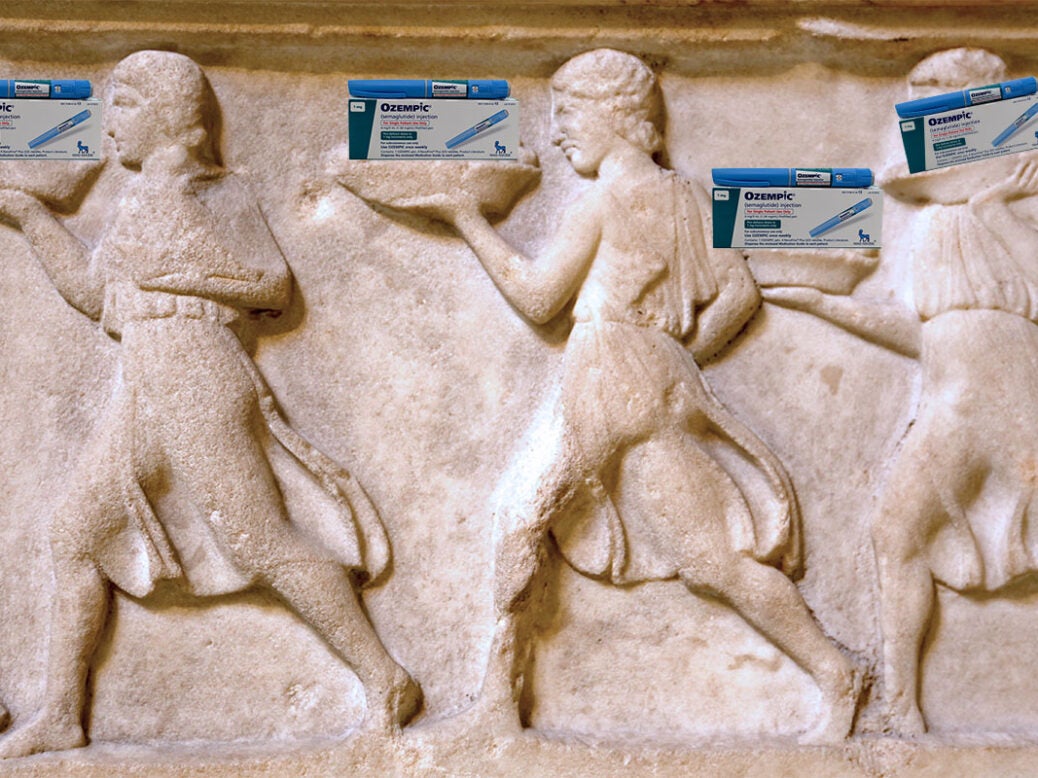
What would the Roman emperors have made of Ozempic, the so-called wonder drug for making fat people thin? The question occurred to me because, while we ordinarily picture the ancient rulers as indulgent over-eaters given to every vice, there is also evidence that a good number of them were partial to platters of waistline-friendly vegetables.
[See also: What watch thefts tell us about Roman history]
Augustus, the first emperor, loved figs, and his stepson and successor Tiberius had quite a thing for cucumbers. Emperor Claudius adored mushrooms – to his peril, as it turned out. He died after eating a poisoned batch of boleti. His successor Nero was so mad about leeks that he acquired the nickname Porrophagus (‘The Leek-Eater’).
Of all the emperors, Augustus appears to have enjoyed the blandest diet, supplementing his figs with beans and bread. Politically, he had every reason to shun extravagant fare, because in the Romans’ eyes this was an obvious sign of wealth, which was a little too regal for contemporary political tastes. Since the overthrow of their last king many centuries earlier, the Romans had nursed a fear of monarchy or autocracy in any form. The very last thing Augustus wanted to do was give the impression of having royal appetites. His new system for power was too new and too frail for him to risk doing that.
Nero also had an excuse for opting for green vegetables over flamingo and dormouse and other popular Roman delicacies. He aspired to be a singer and, while his voice was apparently rather rasping and weak, he believed that leeks would be beneficial to his vocal cords. Presumably because they slipped straight down his throat.
As for Claudius, his obsession with mushrooms was more a matter of taste, and in no way indicative of his desire to eat healthily. It was in fact said that after he consumed his last supper of mushrooms (poisoned, allegedly, by his wife/niece Agrippina), he was given a second dose of poison via the feather he habitually used to make himself sick so that he could eat even more food.
Thin at what cost?
Given his habit, one has to wonder whether Claudius, at least, might have leapt at the chance to take a drug if it saved him the hassle of having to empty his stomach all the time. His nephew and predecessor Caligula, too, might have embraced a drug that enabled him to carry on living in an extravagant manner. Caligula made a show of dining on golden loaves of bread and pearls dissolved in vinegar. He was clearly determined to live up to his most famous dictum, ‘A man should be frugal or be a Caesar’ (ie an emperor).
[See also: How to master Christmas party small talk? Do as the Romans did]
While there was no fashion for men of their status to be thin, a wildly obese body might have made them figures of ridicule and also have hindered their authority as military leaders. An emperor would indeed have found it more practical to be in reasonably good shape as he travelled widely with the army. That several of the Roman emperors went to lengths to disguise their receding hairlines and baldness is suggestive of a degree of vanity.
My suspicion is that, if Caligula or Claudius knew of a drug that would enable them to carry on eating but not put on weight, they might have been tempted to try it. There was no shortage of quacks peddling new and questionable remedies in the ancient world. Unlike many of their modern counterparts, their willingness to take it would surely have been driven by curiosity rather than despair.
[See also: Why you should be conserving your online legacy for future generations]
Far from seeking to become skinny, which was associated largely with the impecunious and deeply religious, they would most of all have liked to resemble the muscular gods, from whom they sometimes claimed to be descended. Even a semi-divine Herculesesque body would have done nicely.
But unlike today’s celebrities, who proudly boast to the tabloids and social media about just how many pounds they have dropped on Ozempic or related drug Wegovy (Elon Musk, for one, credits the meds with his loss of about 13.6kg), my bet is that the Roman emperors would have acted on the sly. They had a particular kind of reputation to sustain, after all.
The Missing Thread: A New History of the Ancient World through the Women Who Shaped It by Daisy Dunn is published by Weidenfeld & Nicolson






